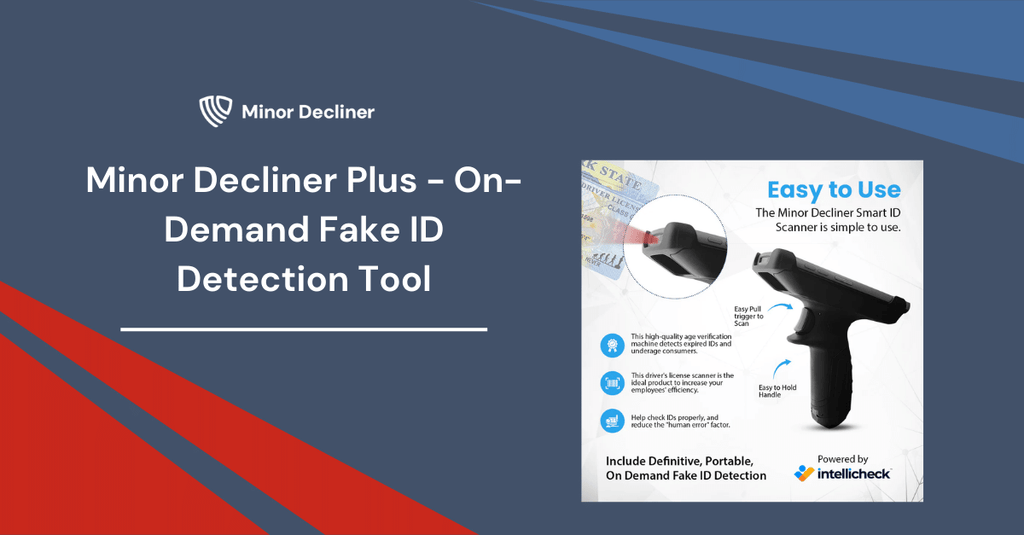In today's digital age, the emergence of highly sophisticated fake IDs has presented a significant hurdle for id scanning technology. While many ID scanners boast about their ability to detect fake IDs, the reality is that not all scanners can deliver foolproof results.
Here, we will explore the reasons behind this limitation and the factors contributing to detecting fake IDs' complexity. Join us as we uncover the truth behind fake ID detection methods and shed light on the evolving landscape of ID scanner technology.
Why Fake ID Detection is Important
Fake IDs pose significant risks to businesses, organizations, and society as a whole. They can be used to gain unauthorized access, engage in illegal activities, and compromise security measures. For this reason, reliable ID scanners must employ effective fake ID detection methods to identify fraudulent identification documents.
What Are the Limitations of Optical Scanners
One of the primary reasons why not every ID scanner is 100% capable of detecting fake IDs is the limitation of optical scanning technology. Traditional optical scanners rely on visible light to capture an image of the ID. While they can detect basic security features like holograms and UV elements, they may struggle with more sophisticated counterfeit IDs that mimic these features. This is where advanced ID scanning technology, like digital ID scanners, becomes crucial.
Major Challenges in Identifying Sophisticated Fakes
Sophisticated fake IDs often employ advanced printing techniques, high-quality materials, and accurate replication of security features. These IDs can be challenging to distinguish from genuine ones, even for well-trained professionals. Consequently, id scanning solutions that solely rely on visual inspection and basic authentication methods may fail to identify these sophisticated fakes. Implementing advanced fake ID detection methods is crucial to overcoming these challenges.
Common Variations in ID Formats
Different countries and regions have their unique identification formats, which can vary significantly in design, security features, and technological sophistication. ID verification systems primarily designed for a specific country or region may struggle to verify IDs from other parts of the world accurately. The lack of universal standards and compatibility can impact the overall effectiveness of id scanner solutions.
Role of Training and Human Intervention
While ID scanners automate the verification process, human intervention and training remain essential. Skilled professionals who are well-versed in identifying fake IDs can provide an added layer of scrutiny. However, not all organizations invest in comprehensive training programs for their staff, leading to potential errors in the identification process. Implementing effective id scanning solutions can help mitigate these errors.
Limitations of DIY Scanning Apps
With the increasing popularity of smartphones, many individuals rely on DIY scanning apps to verify IDs. These apps utilize the device's camera to capture an image of the ID and apply basic verification algorithms. However, the accuracy and reliability of such apps may vary significantly, as they often lack advanced features and rigorous testing compared to dedicated id scanning machines.
Cost Considerations for Enhanced Detection Capabilities
Achieving 100% fake ID detection capability often requires advanced technologies, sophisticated algorithms, and ongoing research and development. These factors contribute to higher costs for ID scanner manufacturers, which are passed on to customers. Balancing cost and detection capabilities is challenging, as not every organization can afford the most cutting-edge ID scanners.
Balancing Speed and Accuracy
Another factor affecting ID scanners' effectiveness is the trade-off between speed and accuracy. Organizations often require quick ID verification processes to maintain efficiency and minimize customer wait times. However, increasing the scanning speed may compromise the accuracy of fake ID detection. Striking the right balance between the two is crucial but challenging.
Technological Advancements in ID Scanning
Despite the challenges, technological advancements continue to enhance the capabilities of ID scanners. Machine learning algorithms, artificial intelligence, and computer vision are being integrated into ID scanning devices to improve accuracy and reduce false positives and negatives. These advancements show promising potential for achieving higher levels of fake ID detection capability in the future.
Legal and Ethical Implications
The use of ID scanners and the collection of personal information raise legal and ethical considerations. Organizations must ensure compliance with privacy laws, data protection regulations, and ethical standards when implementing ID verification systems. Striking the right balance between security and individual privacy is crucial in maintaining trust and transparency.
Minor Decliner Plus- One-Stop Solution for 100% Fake ID Detection
Minor Decliner has partnered with Intellicheck, a trusted Fake ID detection solutions provider, to bring you cutting-edge digital identity verification technology incorporated into the Minor Decliner Plus. This handheld ID scanner device offers unparalleled accuracy and ease of use, setting a new standard in Fake ID detection.
With our "Police Grade" Fake ID checking system, you can confidently combat the challenges of fake IDs. Our partnership with Intellicheck ensures you access the most advanced technology available, trusted by Police Departments and large financial institutions.
Experience the power of innovation in the palm of your hand. The Minor Decliner Plus Scanner combines sophisticated technology with a user-friendly design, making Fake ID detection effortless and efficient.
Don't miss out on this game-changing solution. Schedule a meeting or order your Minor Decliner Plus Scanner today and witness the remarkable capabilities that will revolutionize your Fake ID detection process with our advanced age verification systems.

